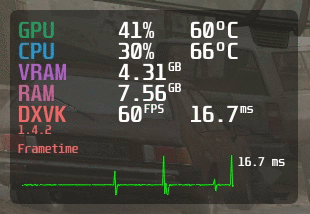Myownfriend
You mean running on the desktop or when gaming etc.?
MangoHud will monitor temperatures, CPU/GPU load, RAM/VRAM utilization, fps/frametimes, etc.

You mean running on the desktop or when gaming etc.?
MangoHud will monitor temperatures, CPU/GPU load, RAM/VRAM utilization, fps/frametimes, etc.



 I will contact you.
I will contact you.
 .
.
Comment